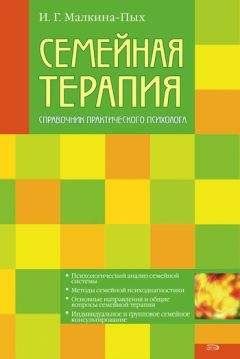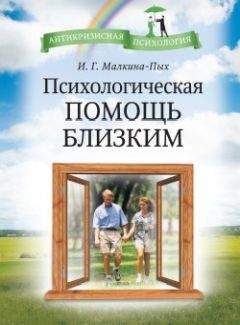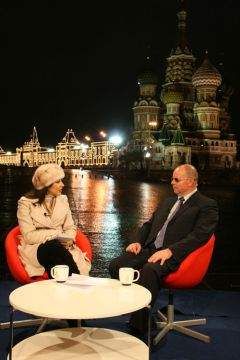Napier A. Y., Whitaker С. A . The family crucible. New York, Harper amp; Row, 1978.
Neighbour R. H. The family life-cycle // J. Roy. Soc. of Medicine, 1985. V. 78. № Suppl. 8. P. 11–15.
Neimeyer R. A. The development of personal construct psychology. University of Nebraska Press, Lincoln, 1985.
Nerin W. Family reconstruction. Long day’s journey into light. New York – London, 1986.
Nichols M. P. Family therapy. Concepts and methods. New York, London, Gardner Press, 1984.
Nye F. J. Role structure and analysis of the family. London, Gardner Press, 1976.
O’Hanlon W., Martin M. Solution oriented hypnosis. An Ericksonian approach. New York, Norton, 1992.
O’Hanlon W. H., Weiner-Davis M. In search of solutions, A new direction in psychotherapy. New York, Norton, 1989.
Oliveri M. E., Reiss D. Family concepts and their measurement, Things are seldom what they seem // Family Process, 1984. V. 23. P. 33–48.
Olson D. H. Circumplex model of marital and family systems. Assessing family functioning // W. Froma (ed.). Normal family processes. The Guilford Press, NY/London, 1993.
Olson D. H. Couples in conflict / Eds. A.S. Gurman, D. G. Rice. New York, Jason Aronson, 1975.
Olson D. H. (ed.). Treating relationships. Lake Mills, Iowa, Graphic Publishing Co., 1976.
O’Neill N., O’Neill G. Open marriage, implications for human service systems // The Family Coordinator, 1973. V. 22. № 2.
Palazzoli S. M. et al. Hypothesising – Circularity – Neutrality, three guidelines for the conductor of the session // Family Process, 1980. V. 19. № 1. P. 3 – 12.
Papp P. Setting the terms for therapy // The Family Therapy Networker, 1984. V. 8. № 1. P. 42–47.
Papp P. The process of change. New York, Guilford Press, 1984.
Parsons T., Bales R. F. Family socialization and interaction process. Glencoe. IL. Free Press. 1955.
Pendagast E. G., Sherman C. O. A guide to the genogram // The Family, 1977. V. 5. P. 3 – 14.
Perls F. S., Hefferline R. E., Goodman P. Gestalt therapy. New York, Delta, 1951.
Pierce R., Nichols M. P., DuBrin J. Emotional expression in psychotherapy. New York, Gardner Press, 1983.
Rabin A. I. (ed.). Projective techniques with children. New York, Grane amp; Stratton, 1960.
Reiss D. E. Family systems in America. New York, Delta, 1976.
Reiss D. E. The family’s construction of reality. Cambridge, Mass., Harvard University Press, 1981.
Richter H. E. Patient familie. Rowohit, Reinbek, 1970.
Ritterman M. K. Paradigmatic classification of family therapy theories // Family Process, 1977. V. 16. P. 29–48.
Rivett M., Street E. Family therapy in focus. London, Sage, 2003.
Rogers C. R. Client-centered therapy. Boston, Houghton Mifflin, 1951.
Rogers С. R. Becaming partners, marriage and its alternatives. N. Y., Delacorte Press, 1972.
Rosensweig S. An outline of frustration theory. Chapter 11 // Hunt J. McV. (ed.). Personality and the Behavior Disorders, New-York, Ronald, 1944.
Roth S. A., Epston D. Developing externalizing conversations, An introductory exercise // Journal of Systemic Therapies, 1996. V. 15. P. 5 – 12.
Rubinstein D. A developmental approach to family therapy. Excerpta Medica International Congress Series No. 274, Psychiatry (Part 1), 24–32. Excerpta Medica. Amsterdam. 1971.
Ruesch J . The observer and the observed, human communication theory // R. Grinker (ed.). Toward a Unified Theory of Human Behavior. New York, Basic Books, 1959.
Rutter M . Helping troubled children. Singapore, 1984.
Sager C. J. Couples therapy and marriage contracts // A. S. Gurman, D.P. Kniskern (eds.). Handbook of family therapy, New York, Brunner/Mazel, 1981.
Sanders M. R., Dadds M. R. Behavioral family intervention. Boston, MA, Allyn and Bacon, 1993.
Satir V. Peoplemaking. Science and Behavior Books, Palo Alto, California, 1972.
Scharff D., Scharff J. Object relations family therapy. New York, Jason Aronson, 1987.
Schiff A., Schiff J. L., Passivity // Transactional Analysis Journal, 1971. V. 1. P. 71–75.
Schindler L., Hahlweg H., Revenstorf D. Partnerschaftprobleme, Moglichkeiten zur Bewaltigung. Berlin, Springer, 1980.
Sedldcek I. Mimomanzelsky vztaz jako faktor ohroiujici zdravy vyvoj ditete // Moravskoslezsky referatovy vyber z psychiatrie, 1980. V. 12. P. 84–86.
Selvini-Palazzoli M., Boscolo L., Cecchin G., Prata G. A ritualized prescription in family therapy. Odd days and even days // Journal of Marriage and Family Counseling, 1978. V. 4. P. 3–9.
Selvini-Palazzoli M., Boscolo L., Cecchin G., Prata G. Family rituals. A powerfull tool on family therapy // Family Process, 1977. V. 16. P. 445–453.
Selvini-Palazzoli M., Boscolo L., Ceccin G., Prata G . Paradox and couterparadox. New York, Jason Aronson, 1978.
S hapiro R. L. Action and family interaction in adolescence // J. Marmor (ed.). Modem psychoanalysis. New York, Basic Books, 1968.
Sharry J. Solution-focused groupwork. London, Sage, 2001.
Skinner B. F. Contingencies of reinforcement. Englewood Cliffs, N. J., Prentice-Hall, 1969.
Solomon M. A. A developmental conceptual premise for family therapy // Family Process, 1973. V. 12. № 2. P. 179–186.
Spanier G., Casto R. Adjustment to separation and divorce // Journ. of divorce, 1979. V. 1, 2. № 3.
Speck R., Attneave, C. Family networks. New York, Pantheon Books, 1973.
Spiegel J. P., Bell N. W. The family of the psychiatric patient // S. Apieti (ed.). American Handbook of Psychiatry. New YorK, Basic Books, 1959.
Spiegel J. P. General systems theory and psychiatry // W. Gray (ed.). Boston, 1969.
Stein M. The marriage bond // Psychoanalytic Quarterly, 1956. V. 25. P. 238–259.
Steiner C. Emotional literacy training, the application of transactional analysis to the study of emotions // Transactional Analysis Journal, 1996. V. 26. P. 31–39.
Steiner C. M. Scripts people live. Transactional analysis of life scripts. New York, Grove Press, 1990.
Stuart R. B. Helping couples change, A social learning approach to marital therapy. New York, Guilford Press, 1980.
Tomm K. Circularity. A preferred orientations for family assessment // A. Gurman (ed.). Questions and Answers in the practice of Family Therapy. New York, Norton, 1981.
Tschudi F. Loaded and honest questions, a construct theory view of symptoms and therapy // D. Bannister (ed.). New Perspectives in Personal Construct Theory. London, Academic Press, 1977.
Tuyn L. K. Solution-focused therapy and Rogerian nursing science, An integrated approach // Archives of Psychiatric Nursing, 1992. V. 6. P. 83–89.
Vogel E. F., Bell, N. W. The emotionally disturbed as the family scapegoat // N. W. Bell, E. F. Vogel (eds.). The family. Glencoe, IL, Free Press, 1960.
Walter J., Peller J. Becoming solution-focused in brief therapy. New York, Brunner/Mazel, 1992.
Watzlawick P., Beavin J., Jackson D. D. Pragmatics of human communication. W. W. Norton amp; Co., New York. 1967.
Watzlawick P., Weakland J., Fisch R. Change. Principles of problem formation and problem resolution. New York, Norton, 1974.
Weiner-Davis M. Pro-constructed realities // S. Gilligan, R. Price (eds.). Therapeutic co nversations. New York, Norton, 1993.
Whitaker C. A. A family is a four-dimensional relationship // P.J. Guerin (ed.). Family therapy. Theory and practice, New York, Gardner Press, 1976.
Whitaker C. A. Psychotherapy with couples // American Journal of Psychotherapy, 1958. V. 72. P. 18–23.
Whitaker C. A., Keith D. V. Symbolic-experiential family therapy // A.S. Gurman, D.P. Kniskern (eds.). Handbook of family therapy. New York, Brunner/Mazel, 1981.
Whitaker C. A., Warkentin J., Malone T. P. The involvement of the professional therapist // A. Burton (ed.). Case studies in counseling and psychotherapy. Englewood Cliffs, NJ, Prentice Hall, 1959.
Whitaker С. А. The growing edge // J. Haley, L. Hоffman (eds.). Techniques of family therapy. New York, Basic Books, 1967.
White M. Re-authoring lives, Interviews and essays. Adelaide, South Australia, Dulwich Centre Publications, 1995.
Whitehead A. N., Russell B. Principia Mathematica, 3 volumes, 2nd edition, Cambridge, Cambridge University Press, 1910–1913.
Wilden A. System and structure. London, Tavistock. 1980.
Williamson D. S. Personal authority via termination of the intergenerational hierarchical boundary. A «new» stage in the family life cycle // Journal of Marital and Family Therapy. 1981. V. 7. P. 441–452.
Winch R. F., Ktones Т., Ktones V. The theory of complimentary needs in mate selection // American Sociological Review, 1954. V. 19. P. 23–43.
Winnicott D. W. Playing and reality. New York, Basic Books. 1971.
Winnicott D. W. Therapeutic consultation in child psychiatry. New York, Basic Books Inc., 1971.
Wirching M. Krebs im Context. Patient, Familie und Behaldungssystem. Klett-Cota, 1988.
Wood B. Proximity and hierarchy, Orthogonal dimensions of family interconnectedness // Family Process, 1985. V. 24. P. 497–507.
Wynne L. C. Some indications and contraindications for exploratory family therapy // I. Boszormenyi – Nagy, J. L. Framo (eds.). Intensive family therapy, Theoretical and practical aspects. New York, Harper amp; Row, 1965.
Yablonsky L. Psychodrama. Resolving emotional problems through role playing. New York, Gardner Press, 1981.
Yalom I. D. The theory and practice of group psychotherapy (2nd ed.). New York, Basic Books, 1975.
Zinner J. The implications of projective identification for marital interaction // H. Grunebaum, J. Christ (eds.). Contemporary marriage, Structure, dynamics and therapy. Boston, Little, Brown amp; Co., 1976.
Zinner J., Shapiro R. Projective identification as a mode of perception and behavior in families of adolescents // International Journal of Psyclioanalysis, 1972. V. 55. P. 523–530.
Zweig C., Abrams J. (eds.) Meeting the shadow. The hidden power of the dark side of human nature. Los Angeles, 1991.
Абабков В. А., Перре М., Планшерел Б. Систематическое исследование семейного стресса и копинга // Обозрение психиатрии и медицинской психологии им. В. М. Бехтерева. 1999. № 2.
Абалакина М. А. Межличностное взаимодействие и динамика предбрачных отношений. Дис. канд. психол. наук. М., 1987.
Абрамова Г. С. Введение в практическую психологию. Екатеринбург: Деловая книга. М.: ACADEMI, 1995.
Абрамова Г. С. Графика в психологическом консультировании. М.: ПЕР СЭ, 2001.
Абрамова Г. С. Практикум по психологическому консультированию. Екатеринбург: Деловая книга. М.: ACADEMI, 1995.
Абрамченко В. В. Психосоматическое акушерство. СПб.: Сотис, 2001.
Аванесов В. С. Тесты в социологическом исследовании. М.: Наука, 1982.
Адлер А. Понять природу человека. СПб.: Академический проект, 1997.
Адлер А. Практика и теория индивидуальной психологии. Лекции по введению в психотерапию для врачей, психологов, учителей. М.: Изд-во Института психотерапии, 2002.
Айви А. Е., Айви М. Б., Саймэк-Даунинг Л. Психологическое консультирование и психотерапия. Методы, теории и техники. Практическое руководство. М.: Маркетинг, 1999.
Аккерман Н. Диагноз невротического семейного взаимодействия // Семейная терапия. Хрестоматия. Э. Г. Эйдемиллер, Н. В. Александрова, В. Юстицкис (сост.). СПб.: Питер, 2000.
Аккерман Н. Роль семьи в появлении расстройств у детей // Семейная терапия. Хрестоматия. Э. Г. Эйдемиллер, Н. В. Александрова, В. Юстицкис (сост.). СПб.: Питер, 2000.
Аккерман Н. Семейный подход к супружеским расстройствам // Семейная терапия. Хрестоматия. Э. Г. Эйдемиллер, Н. В. Александрова, В. Юстицкис (сост.). СПб.: Питер, 2000.
Аккерман Н. Теория семейной динамики // Семейная психотерапия. СПб.: Питер, 2000.
Алешина Ю. Е. Цикл развития семьи: Исследования и проблемы // Вест. Моск. ун-та. Психология. Сер. 14. 1987. № 2.
Алешина Ю. Е., Борисов И. Ю. Полоролевая дифференциация как показатель межличностных отношений супругов // Вестник Моск. ун-та. Сер. 14. Психология. 1989. № 2.
Алешина Ю. Е., Гозман Л. Я., Дубовская Е. М. Социально-психологические методы исследования супружеских отношений. М.: МГУ, 1987.





